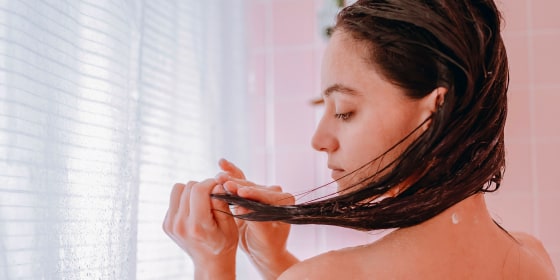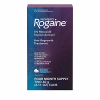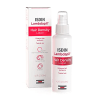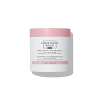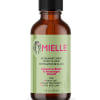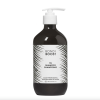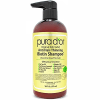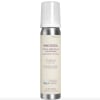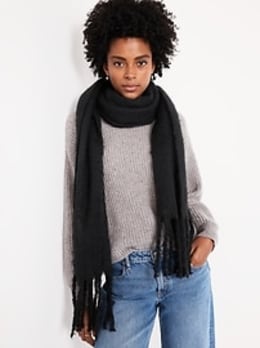While it's normal to see a handful of hairs going down the drain or getting stuck to your blowdryer's bristles post-blowout, there is such a thing as too much shedding. Before you panic about the strands found daily on your pillow, according to the American Academy of Dermatology, it's normal to lose around 50 to 100 hairs a day.
Now, if you've noticed more hair getting stuck on your brush after a detangling session lately, there could be a simple explanation: It may just be the change of season. We spoke to two experts to get all the details on seasonal hair loss (and some other potential shedding culprits), including why it happens and when it may be a sign of a bigger issue.
What causes seasonal hair loss? | Best products for hair loss | How long does seasonal hair loss last? | Does seasonal hair loss grow back? | Can COVID-19 cause hair loss? | Meet our experts | How we chose
What causes seasonal hair loss?
Seasonal hair loss is real, says Dr. Angela Lamb, director of the Westside Mount Sinai Dermatology Faculty Practice in New York City. However, experts aren't actually 100% sure why it happens. "We think it may be due to perhaps dietary changes people make during different seasons or the weather change," Lamb says. "The hair goes through three cycles: Telogen, anagen and catagen. So it has growth phases, it has resting phases and then it has dying off, falling phases. And those can cycle at different rates. So people may just feel like they're losing hair, when it may just be that the hair is cycling differently at different times of the year."
Lamb says that it typically happens as the seasons change. "I've been seeing so much of it over the last couple of months," she adds. Anecdotally, for Lamb, it seems to be the most common in fall and winter as we transition from warmer to colder weather.
Dr. Robert Finney, a board-certified dermatologist in New York City, says that seasonal shedding typically peaks in September, though one research paper has suggested that there might also be a second uptick in April.
If you are concerned, it’s a good idea to make an appointment with your dermatologist for an evaluation. In the meantime, we’re sharing some expert-approved and reviewer-loved products for hair loss that you can use to revive your tresses.
Best products for hair loss
Women's Rogaine 5% Minoxidil Foam
- Tried-and-true formula
- Dries quickly
- Easy to apply
- The pump can be faulty
Size: Two 2.11 oz. cans | Key ingredients: Minoxidil, AHAs
Both experts recommended Rogaine as a tried-and-true solution for hair loss. The treatment has been clinically-proven to boost hair growth when used consistently.
One thing to note though: "One of the common side effects is increased shedding when you first start it," Finney says. "For people who are already shedding, it can be a little alarming. So I always counsel that it's normal, it's just kicking your hair that was about to go into the resting phase out. It's going to regrow, and it's going to regrow healthier."
Isdin Lambdapil Hair Lotion
- Nice scent
- Increases thickness
- Small amount of product
Size: 4.2 oz. | Key ingredients: Diaminopyrimidine oxide, ginkgo biloba, D-biotin
Board-certified dermatologist Dr. Michelle Henry previously recommended this lotion, which contains diaminopyrimidine oxide, ginkgo biloba and biotin, as an alternative to minoxidil. It's designed to be applied to your scalp daily to boost hair volume and thickness over time – without leaving a greasy residue.
Christophe Robin Cleansing Volumizing Paste
- Claims to protect color
- Deeply cleanses
- Only a small amount is needed
- Scent can be strong for some
Size: 75 ml | Key ingredients: Rassoul mineral clay, baobab Leaf extract, and centifolia rose water
If you just want your hair to look a little fuller during times of temporary shedding, Lamb says that you can use a cosmetic product to add more volume to the hair. As someone who experienced postpartum hair loss, she says that this paste was something she used to help her hair look more voluminous.
Mielle Organics Rosemary Mint Scalp & Hair Strengthening Oil
- Viral product
- Very nourishing
- Can be runny
Size: 2 oz. | Key ingredients: Castor seed oil, Rosemary oil
One expert previously told us that rosemary oil has been shown to be equivalent to 2.5% minoxidil. And this bestselling oil is designed with rosemary oil and mint to help strengthen, lengthen and nourish hair, the brand says. The company adds that it’s made to deeply nourish types 3A to 4C hair, chemically-treated hair, braids and weaves.
“My hair was damaged for years and this helped with my hair loss,” one reviewer wrote. “I’ve started using this product two years ago and I’ve been using it ever since!! if you’re thinking about purchasing, GET IT NOW.”
Bondi Boost Hair Growth Shampoo
- Doesn't contain sulphates
- Strengthens scalp
- Some say hair felt heavy
Size: 16.90 oz. | Key ingredients: Rosemary oil, peppermint oil, aloe vera
A stylist previously recommended this shampoo to us as a solution for those with thinning hair. It features ingredients like saw palmetto, peppermint oil and rosemary oil, which the brand says can help purify the scalp and fight back against thinning hair.
Pura D'Or Original Gold Label Anti-Thinning Biotin Shampoo
- Softens hair
- Thickening
- Amazon reviewer favorite
- Some say it can be drying
Size: 16 oz. | Key ingredients: Tea tree oil, Argan oil
One expert previously told us that shampoo is great for those with sensitive scalps. It's made with ingredients like biotin, nettle extract, pumpkin seed and black cumin seed oil, which the brand says help increase volume and thicken hair.
Virtue Minoxidil 5% Foam
- Easy to apply
- Foam isn't runny
- Nozzle can be faulty
Size: 16 oz. | Key ingredients: Minoxidil
"This is a tried-and-true treatment that promotes faster, thicker hair growth," Dr. Leah Jacob, an assistant professor of dermatology at Tulane University, previously told Shop TODAY. "Newer formulations allow for easier, less messy application.”
How long does seasonal hair loss last?
Here’s the good news: Seasonal hair loss and telogen effluvium are temporary. “A true telogen effluvium is non-scarring, non-permanent hair loss,” Finney says. “And it’s usually something that occurs for a finite amount of time, whether it be six weeks or several months. And then, as long as you can identify the cause — or if you can’t, like in the event of postpartum — it just stops at one point, usually several months after, and you start to regrow.”
If you see an uptick in shedding and it matches up with one of the above common causes, Finney says, “try not to focus on it too much, but maybe set a reminder in your calendar to check back in in two weeks or four weeks and kind of reassess.” If it hasn’t stopped by then, see your dermatologist who can evaluate this concern. “That’s when we’ll usually check bloodwork to make sure there’s not an underlying medical condition,” he added.
Does seasonal hair loss grow back?
If you’re just experiencing seasonal shedding, it won’t make a big difference in your mane overall as the hair will grow back. But if you are noticing a big difference in volume or are seeing more of your scalp than before, it could be a sign of an underlying issue.
“If you’re noticing it, you likely have a component of genetic hair loss underlying it, and now you’re noticing it more, especially if you’re in your 30s, 40s or 50s,” Finney says. “Because when you have a portion of your hair shed, say like 10% of it sheds, it’s a lot more noticeable if you only have 50% of what you started with when you were a kid. Whereas if you still had 100% of your hair, no amount of shedding is really going to be noticeable.”
Can COVID-19 cause hair loss?
Aside from the change in seasons, there’s another potential explanation for why you’ve been losing more hair recently: COVID. Research has shown that some people experience hair loss as a long-term side effect after being infected with the virus. This is because telogen effluvium, otherwise known as “stress-induced hair loss,” can occur after illness, hospitalization or postpartum, Finney says. While COVID and hair loss have been linked, the reasoning behind the connection is unclear.
Meet our experts
- Dr. Angela Lamb is the director of the Westside Mount Sinai Dermatology Faculty Practice in New York City
- Dr. Robert Finney is a board-certified dermatologist based in New York City who specializes in hair loss and cosmetics.
- Dr. Leah Jacob is an assistant professor of dermatology at Tulane University.
How we chose
The Shop TODAY team spoke with experts in the hair industry, including dermatologists Dr. Angela Lamb, Dr. Robert Finney and Dr. Leah Jacob, to gain insight into choosing the right treatment for hair loss, as well as tips for proper usage.
We then scoured the internet and chose shopper-loved items that met the guidelines provided by the experts.

